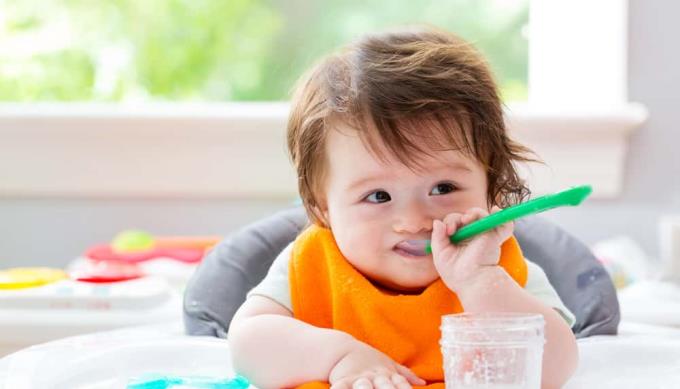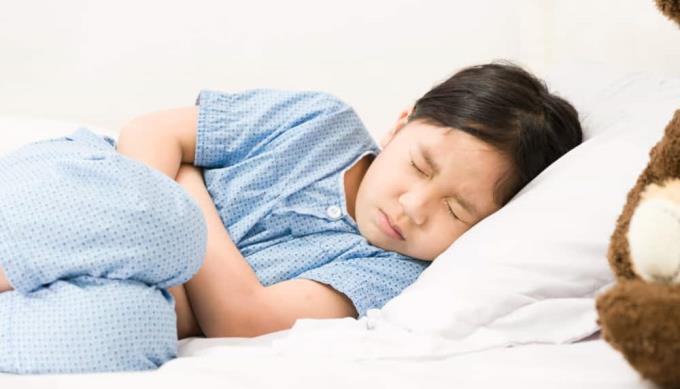Ways to determine an infants caloric needs

Learn how to determine your baby’s caloric needs, including the calories in breast milk and formula, to ensure your infant gets the right nutrition for healthy growth.
The child's digestive system is often weak and the baby is susceptible to health related problems, one of which is the condition of the baby having mucus.
Test: How good is a newborn stool?
In cases where the child has a bowel movement with only a small amount of mucus in the stool, it will not be of concern if there are no other symptoms attached. On the contrary, a large amount of mucus occurs during consecutive times the child has a bowel movement, accompanied by signs such as allergies, infection, that is another problem.
In a newborn baby, when a baby's diaper is found to have mucus inside, but no symptoms of any symptoms are usually not signs of illness. However, when it occurs in large amounts and lasts for many days, you should worry, as it is more likely to be an underlying health problem.
Mucus is a natural part of the body that occurs in many different parts. Particularly with the intestinal system, mucus plays a protective role, supports digestion and helps to excrete stools. So, sometimes this substance will appear in feces.
Children with diarrhea , the common manifestation will be loose, watery stools and sometimes mucus in the stool. However, in breastfed babies, the common symptom will be loose stools and lumpy pigs, making it difficult to distinguish the difference between normal bowel movements and diarrhea.
Some signs of diarrhea include:
Peristalsis more active than usual
Children show pain, discomfort such as crying, writhing or some unusual behavior
Decreased urination (this could also be a sign that the baby is dehydrated)
Bacterial or viral infections, dietary changes, and many other problems can cause diarrhea. Babies with diarrhea usually go away on their own, but it's important for mothers to make sure they are adequately hydrated. For mothers, diet and hygiene issues also greatly affect the quality of breast milk, so it is important to pay attention.
In children under 3 months of age persistent or severe diarrhea can quickly cause dehydration. Diarrhea can be severe and can even cause death, so it is necessary to handle it promptly when the baby shows signs of dehydration, diarrhea lasting more than 2 days.

Food allergies or sensitivities can cause diarrhea or lead to mucus, although this is uncommon. In breastfed babies, a sudden change in the mother's diet can be the cause, in which, the baby may be sensitive to ingredients such as iron, soy or some other ingredients that the mother consumes.
For older babies who are already using solid foods, consuming certain foods can also cause diarrhea. This is an early warning sign of food sensitivity to common symptoms such as changes in stool color or consistency.
Sometimes a sudden change in a baby's diet, such as switching to a new formula or giving a new baby formula, can cause diarrhea for several days. Consult with your pediatrician about how to control changes in your child's diet to minimize the risk of diarrhea and stomach pain.
Changes in how to breastfeed your baby can also affect the structure of your baby's stool. For example, some babies breastfeed for a short time before turning to the second breast with green stools.
Infants and young children have mucus stools sometimes depending on the amount of colostrum (Foremilk) or hindmilk, the baby receives while breastfeeding. Colostrum is the milk available when the baby starts to breastfeed, like a watery " dessert ", rich in vitamins and proteins, and at the same time creates an appetite for the baby. While final milk is usually in the final stage, it has more energy and nutrients to help the baby feel full and gain weight well.

Babies may have mucus and blood in their stools. There are a number of reasons, such as constipation, that makes stools dry. Therefore, it is important to ensure that children are provided with adequate water and fiber to prevent this situation.
Need to take your child to the doctor immediately if signs appear:
Heavy bleeding - more than just a few streaks in the stool
The bleeding disappeared and returned a few days later
Diarrhea that is bloody (with or without mucus).
Rarely, a child with mucus can signal a serious problem. If the stools look unusually large or have a bad smell, the problem may be due to steatosis (a condition in which a significant amount of fat is found in the stool).
There are countless causes of young stools. These include:
Health problems in the liver: When children have liver problems, they often manifest as: yellow pigmentation of the skin and eyes, irregular urination. In rare cases, your baby's stools may also turn pale or white.
Problems in the pancreas: When the pancreas is not working properly, the body is unable to absorb or digest fat properly, resulting in the child's stool can also become pale or white.
Disease that makes children less absorbable: In children who have started eating solid foods, illness such as celiac disease (intestinal disease caused by gluten-protein sensitivity in wheat) or cystic fibrosis is A good example is the child's difficulty digesting fat.
The surrounding environment also affects a child's health a lot. When children live in unhygienic areas, they will be susceptible to infections that lead to diarrhea, with some typical bacteria such as E.coli; Salmonella; Shigella… The general symptoms are that your baby may have a high fever, nausea, diarrhea, a child with mucus and possibly blood.
In some cases, children with mucus may also be due to their intolerance to certain foods, antibiotics , lack of digestive enzymes or a cold.

If you only detect a little bit of mucus in the baby's stool, rest assured and wait until this symptom disappears. However, if you experience any of the following conditions, your child should see a doctor immediately:
There is a lot of mucus in the child's stool
In addition to infants and young children having mucus passing, there are other symptoms such as diarrhea, fever, or soreness.
Babies born prematurely or less than 3 months old have this condition
Your baby has a weak immune system due to illness or drug use
Even if you are unsure of a symptom, you need to be cautious and it's best to see your doctor soon for answers.
You need to take your child to the emergency room immediately if you have:
There is a large amount of blood in the child's stool
The stools are white and the child is in poor performance
Children experience signs of dehydration such as: dry chapped lips , sunken eyes or irregular urination
Stop breastfeeding.
With the shared information about the situation of children with mucus diarrhea above, we hope that parents will have more useful knowledge in caring for their children. At the same time, parents should not subjectively ignore any unusual symptoms in their child, because it can be a warning sign of a medical condition that requires prompt treatment.
Learn how to determine your baby’s caloric needs, including the calories in breast milk and formula, to ensure your infant gets the right nutrition for healthy growth.
Discover the top 5 smartest dog breeds in the world, including Border Collie, Poodle, German Shepherd, Golden Retriever, and Doberman Pinscher. Learn about their unique traits and why they are considered the most intelligent dogs.
Discover 7 nutritious and delicious ways to cook egg porridge for babies, including recipes with cheese, pumpkin, tomato, and more. Learn how to prepare baby-friendly egg porridge with our expert tips.
After a series of medical measures they obtained a complete human vascular system profile.
Watermelon is one of the fruits that many people love, not only cheap but also delicious, nutritious and refreshing in the summer. To get delicious watermelon pieces, show off your housewives, your artistic talents to cut beautiful pieces of watermelon.
aFamilyToday Health - The digestive system and body in each baby is different. Parents need to recognize notes to deal with when babies have a food allergy!
Babies need many factors for perfect development. aFamilyToday Health shares with parents things to keep in mind when babies are 8 weeks old so that parents can take care of their babies the best!
Babies need many factors for perfect development. aFamilyToday Health shares with parents things to keep in mind when babies are 18 weeks so that parents can take care of their babies the best!
Babies need many factors for perfect development. aFamilyToday Health shares with parents things to keep in mind when babies are 28 weeks old so that parents can take care of their babies the best!
Babies need many factors for perfect development. aFamilyToday Health shares with parents things to keep in mind when babies are 32 weeks old so that parents can take care of their babies the best!








